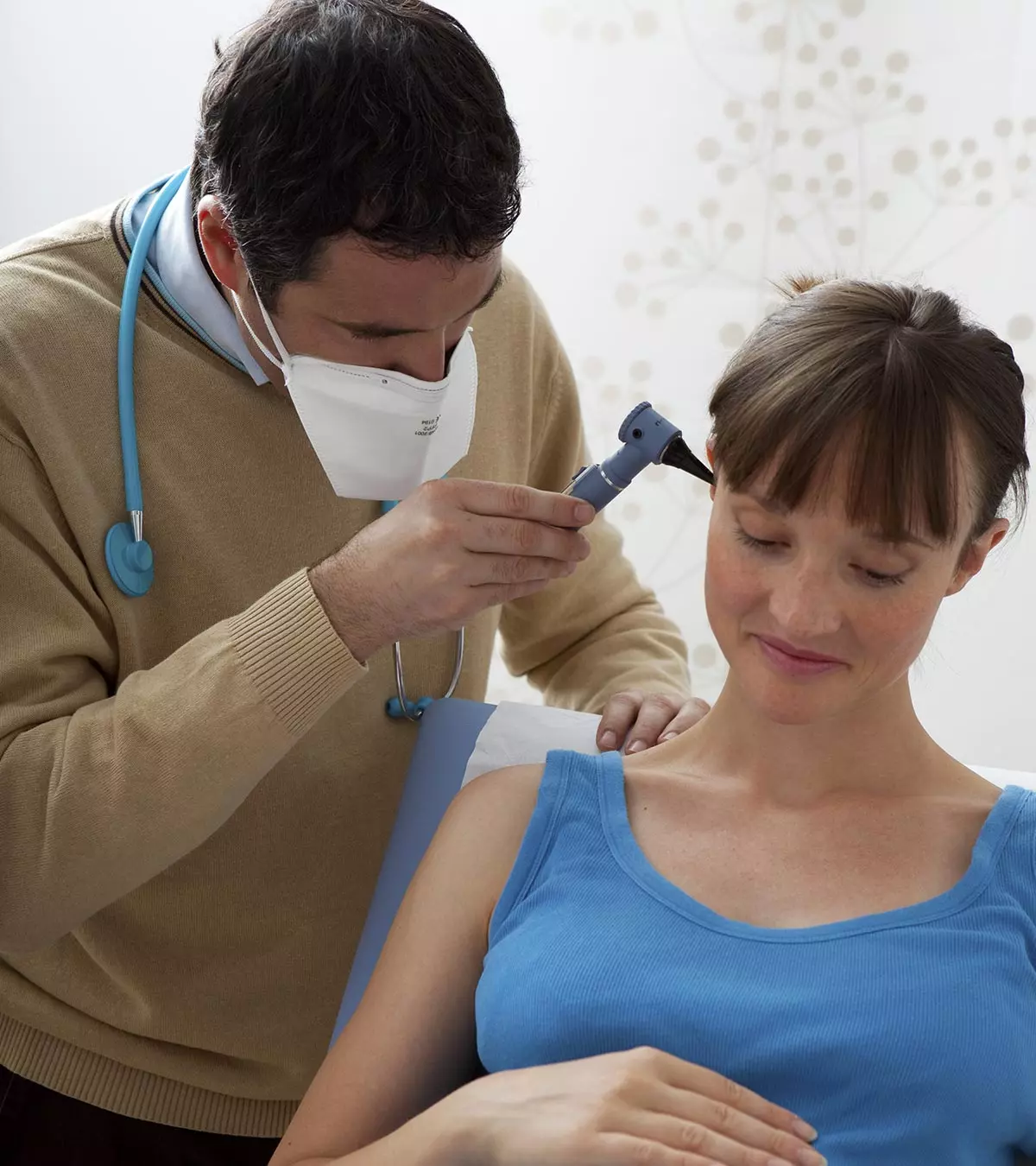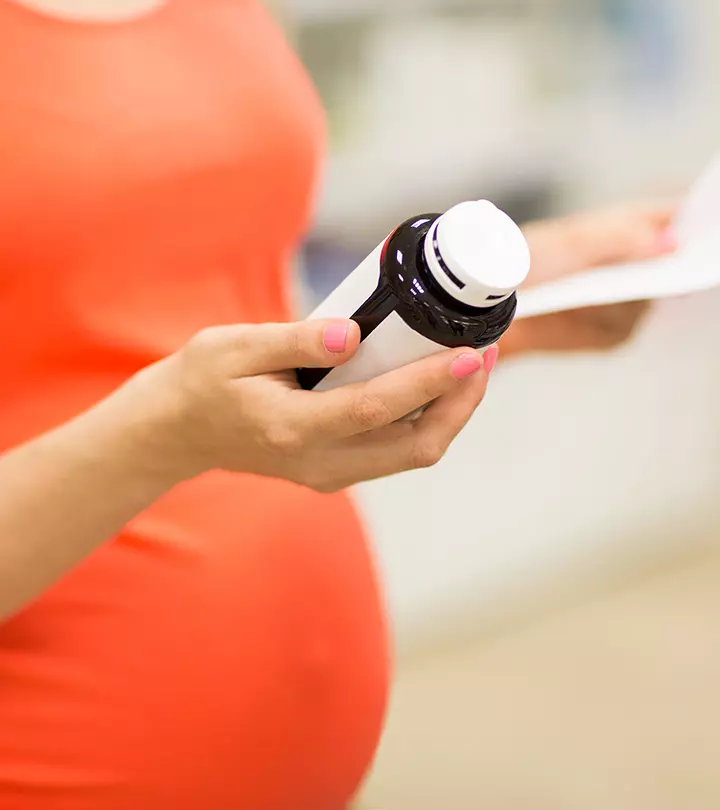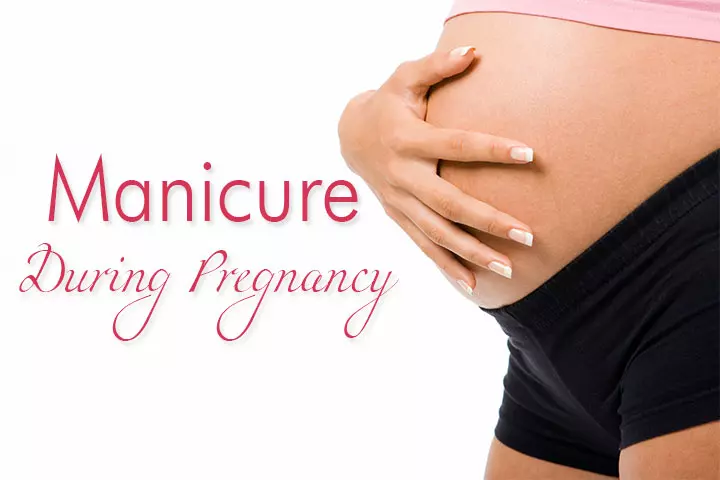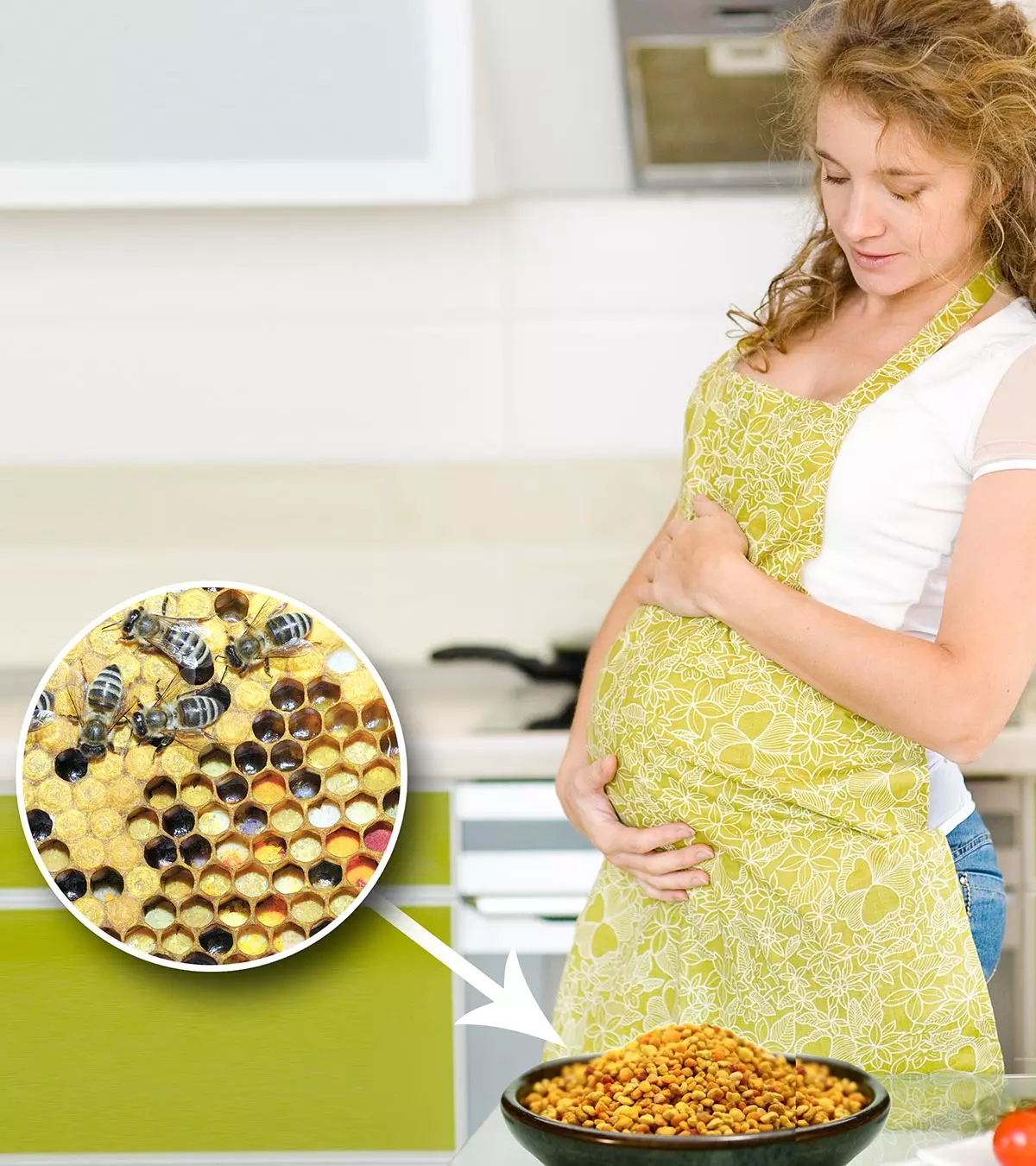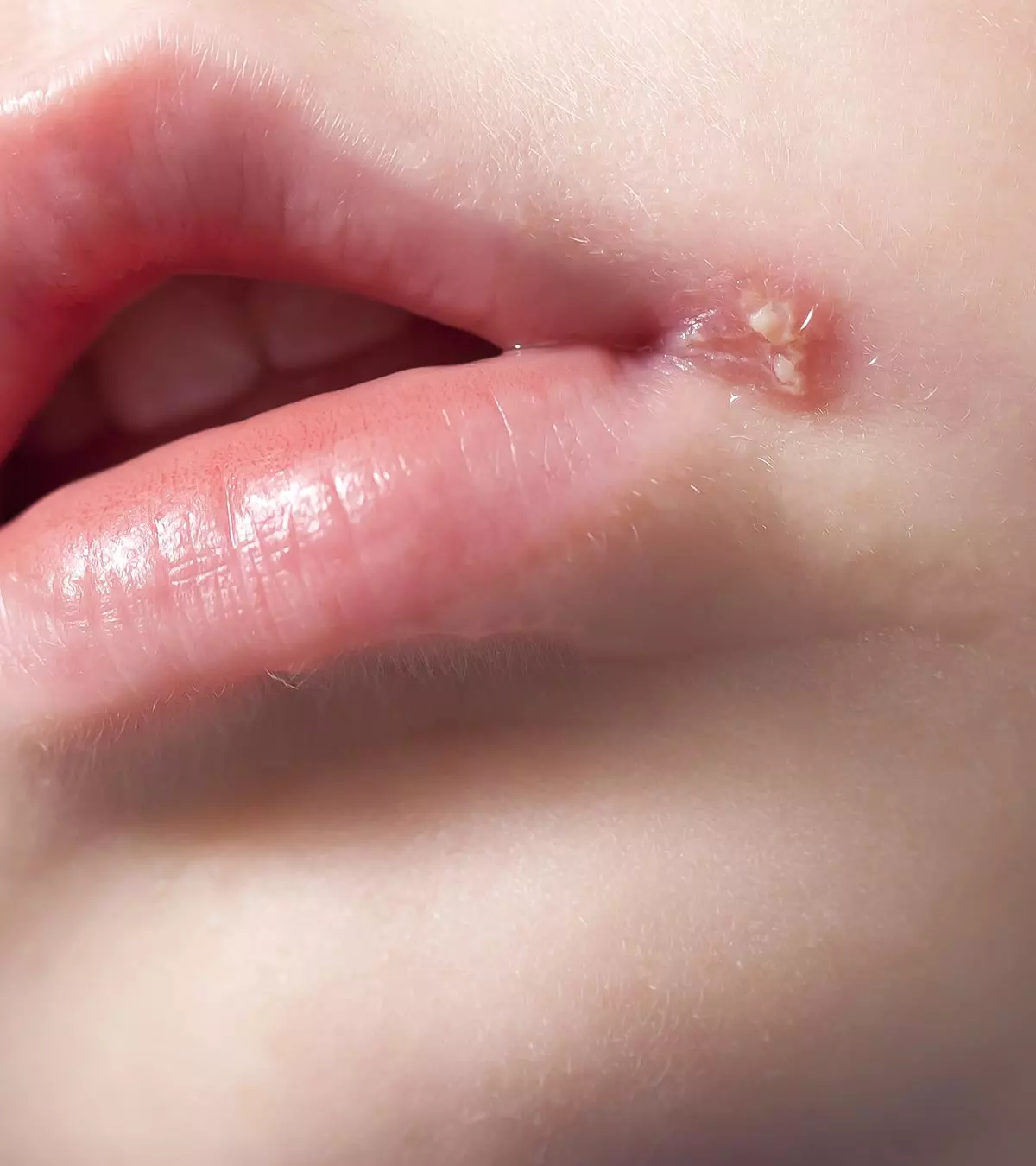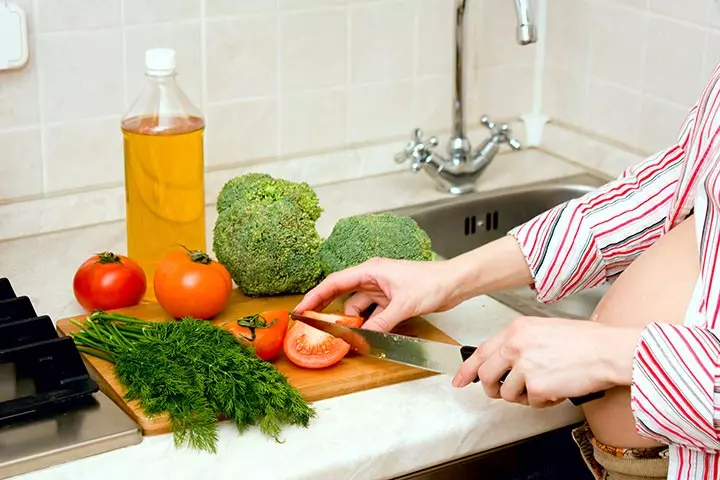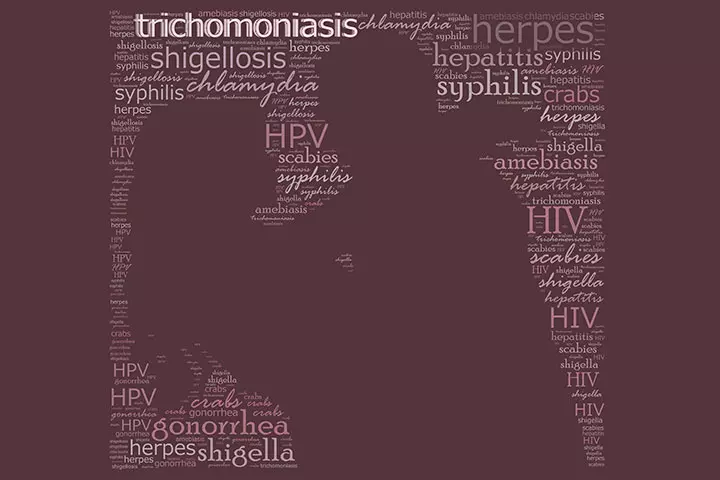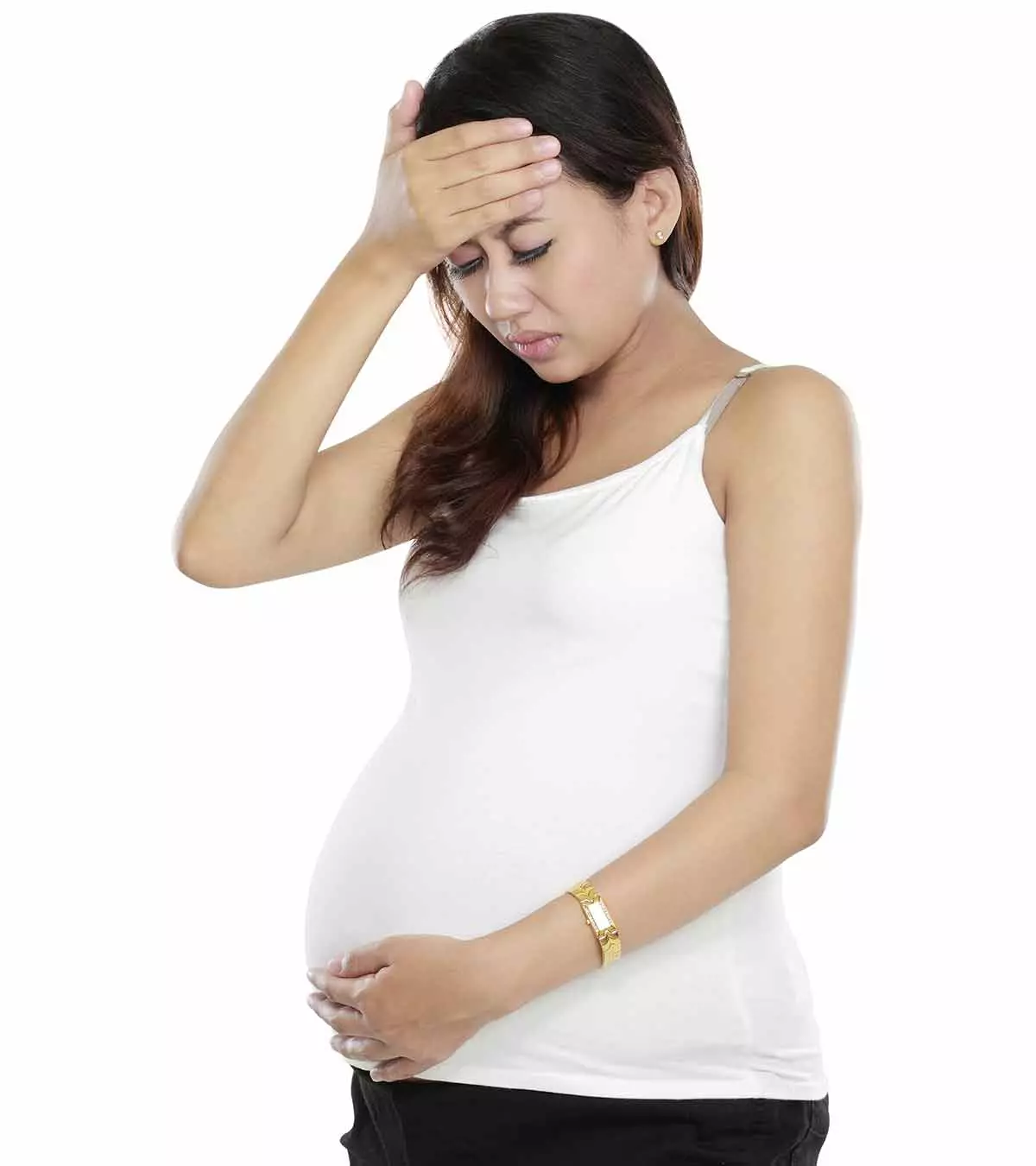
Image: ShutterStock
E. coli infection during pregnancy can cause adverse pregnancy outcomes such as preterm rupture of the membrane and preterm birth (1). E.coli bacteria most commonly cause urinary tract infections by entering the urogenital tract. It can be contracted from contaminated food and water sources or through direct contact with an infected person or animal. However, avoiding the risk factors may prevent E.coli infections in pregnant women (2).

Read on to know more about the transmission and complications of E.coli infection during pregnancy.
Key Pointers
- E. coli is typically harmless, but it can cause urinary tract infections in pregnant women.
- The infection can be contracted from consuming unwashed vegetables, feces, undercooked meat, or contaminated water.
- Symptoms of an E. coli infection include nausea, stomach cramps, diarrhea, and a burning sensation during urination.
- Proper hygiene while cooking and frequent handwashing can help prevent E. coli infections.
- Pregnant women who develop an E. coli infection should seek medical attention promptly to reduce the risk of complications.
What Is E. Coli?

Escherichia Coli or E. coli is a bacterium that is naturally present in your gut and vagina and is generally harmless.
The trouble arises when it travels to places where it should not be, like your stomach or kidneys. Also, there are different strains of E. coli bacterium and some of them can be dangerous. In such circumstances, it may cause infections, which can be risky during pregnancy (3).
What Are The Sources Of E. Coli?
While some form of E. coli is already present in your body, other sources can pass on the bacteria to your system (4):
- Raw fruits and vegetables, especially when improperly washed, may lead to a foodborne illness. According to the US Food and Drug Administration (FDA), about 48 million people are affected by foodborne illnesses caused by E.coli each year.
- Improperly cooked or unclean meat in any form.
- Animal and human feces.
- Water from swimming pools that is not treated with chlorine or is infected.

E. coli can also spread by touch. If a person has the bacteria on their hands and touches you, it can be transferred to you
.
What Are The Symptoms Of E. Coli Infection During Pregnancy?
In case you get infected with another strain, it can adversely affect maternal and fetal health; hence you should watch out for the following symptoms (1) (5):
- Diarrhea, sometimes accompanied by bleeding.
- Stomach cramps and pain.
- Nausea and vomiting.
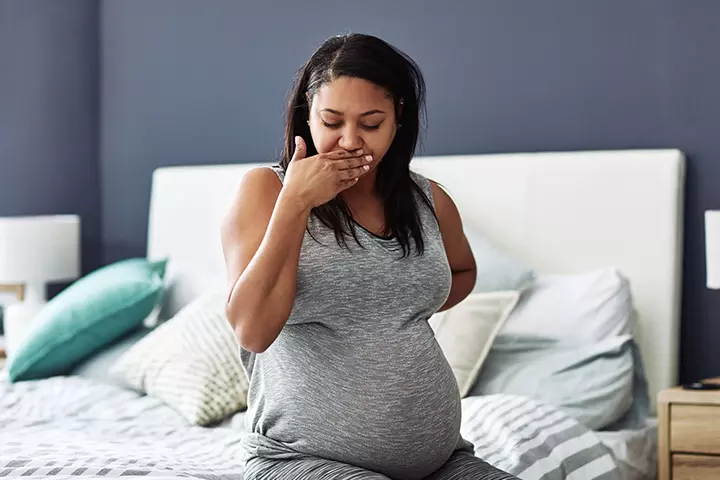
In most cases, it is difficult to realize that the infection is present, as the symptoms can be confused with something else. This makes it all the more tough to control the infection at the early stage.
E. Coli Infection And Pregnancy
The symptoms that accompany the infection may make you weak, restless, and dehydrated. The presence of severe E. coli infection during pregnancy may increase the risk of stillbirth, low birth weight, neonatal meningitis, and neonatal sepsisiA life-threatening condition that occurs when the body's immune system overreacts to an infection (10) (13). Further, your unborn baby may be affected in the following manner:
- The infection has not been known to pass on to the unborn child through the placenta, so it does not have any direct effect.
- The bacterium that is found in the vagina can pass on during delivery. So if you have had E. coli infection during pregnancy, doctors will check your baby for any infections (13).
- Due to diarrhea and vomiting, you may feel weak and dehydrated. This can impact your unborn child and cause complications such as premature birth or preterm rupture of membranesiA breaking of the amniotic sac before the beginning of labor (PROM) (10).
- In case you have bleeding or severe cramps, immediately call your doctor. These symptoms, if aggravated, can cause miscarriage also.
Nicole Louise experienced a miscarriage as a result of an E. coli infection. She reveals, “I woke up at about 1 a.m., and we were having a miscarriage. I asked Matt (her husband) to go to the hospital now. We went, and as soon as we got there, I started experiencing intense pain. I was struggling to breathe, and they (the healthcare team) said my lungs were filling up with fluid, which is a sign of infection. At this point, they didn’t know what kind of infection. All they knew was that they needed to get me to the emergency room very quickly, do surgery to evacuate everything, and then tackle the infection and where it was. So I went in for this surgery, and we all thought, okay, it’s going to be in and out surgery, but that wasn’t the case at all.
“The infection got so bad I got septic. After this, I was moved to another room and had my breathing tube taken out, but we are still fighting the infection. At this point, the staff said that the cultures had come back, which they had submitted to the lab, and it was, in fact, E. coli. The E. coli got into my uterus. In the end, doctors said that it is a very rare case, an E. coli infection causing a miscarriage (i).”

- E. coli infection during pregnancy is diagnosed by testing a stool sample to check for the presence of the bacteria (1).
- Antibiotics may be prescribed to treat the infection. But some of these medicines are not safe for your baby, especially in the last trimester. Therefore consulting a doctor is recommended before trying any self-treatment methods during pregnancy (10).
 Quick fact
Quick factHow To Avoid E. Coli Infection In Pregnancy?
While you are pregnant, regular urine cultures are done to find out whether you are infected with E. coli. Here are some tips to steer clear of the infection (2) (10):
- Watch what you are eating. Properly wash all fruits, and clean and cook all vegetables and meat to remove impurities.
- Clean the place where you wash raw meat with a good disinfectant.
- Wash your hands with soap after each visit to the washroom, touching or cleaning animals, and before having meals.

- After using the toilet, wash and wipe from front to back.
- Swim in disinfected pools and bath afterward.
- Avoid touching animal feces and petting infected animals.
- Avoid drinking infected water, instead opt for purified and boiled water.
- Avoid eating cheeses made from unpasteurized dairy.
 Quick tip
Quick tipAs in all infections, basic hygiene is the key to being healthy. Avoiding food from unreliable eateries is the best precaution. Also, drink lots of water to flush away the germs and remain hydrated.
Points To Remember
- Since nausea and upset stomach are common during pregnancy, the infection often goes unnoticed.
- If you notice any of the above-stated symptoms or have a fever, then consult your doctor.
- It is best to have a test and get medications at the right time.
- One of the easiest ways to stay healthy during pregnancy is to ensure you are always in a clean environment and try to eat home-cooked meals as much as possible.
Frequently Asked Questions
1. How is E. coli in urine treated during pregnancy?
Urinary tract infection from E.coli during pregnancy is treated using antibiotics. Intravenous administration of second and third-generation cephalosporins is safe and effective. Nitrofurantoin and fosfomycin are also found to be effective in treating E.Coli infection during pregnancy (6).
2. Can a baby be born with E. coli?
Every person has E.coli in their bodies, but only some babies may get infected with E.coli when they pass through the birth canal during vaginal deliveries or by exposure to the bacteria at the hospital or home. Babies showing illness from E.coli infection may be born with a weaker immune system and are therefore more vulnerable to experiencing illness (7).
3. Can E. coli infection cause miscarriage?
Uncontrolled diarrhea during pregnancy from E.coli infection may lead to severe dehydration. While E.coli infection may not be directly responsible for miscarriage, dehydration may lead to pregnancy-associated complications such as preterm labor (1) (8).
4. Can E. coli cause stillbirth?
Yes, a severe and untreated E.coli infection might lead to stillbirth. However, not all cases of E.coli infection may experience stillbirth. Timely medical intervention can help avoid such complications (1).
5. How common is E. coli infection in pregnancy?
E.coli infection may affect about 34% of pregnancies. Hence the prevalence of this infection is considered high in pregnant women (11).
6. Can E. coli go away on its own?
An E.coli infection may resolve without treatment within five to ten days (12). However, it is wise to consult a doctor as soon as symptoms appear.
Even though E. Coli bacteria are commonly present in the body, you need to be aware of the symptoms when it turns infectious. As a pregnant woman, staying aware of E. Coli infection during pregnancy is important to prevent miscarriage or possible preterm delivery complications. Remember to eat thoroughly cooked food and stay clean by following the preventive measures to avoid contracting the infection. Do not overlook any symptoms and consult your ob/gyn to seek appropriate and safe treatment for E. Coli infection during pregnancy.
Infographic: Tips To Prevent Of E. coli Infection During Pregnancy
Some strains of E. coli may cause food poisoning and other infections. And during pregnancy, it is essential to take precautions to prevent E. coli infection, as it can lead to severe complications for both the mother and the baby. Check out the infographic below to learn tips to prevent E. coli infection during pregnancy.
Some thing wrong with infographic shortcode. please verify shortcode syntaxPersonal Experience: Source
MomJunction articles include first-hand experiences to provide you with better insights through real-life narratives. Here are the sources of personal accounts referenced in this article.
i. My battle with E. coli infection and miscarriage at 18 weeks!https://www.youtube.com/watch?v=f1Yh4cTxWdk&feature=youtu.be
References
- Escherichia coli (E. coli).
https://mothertobaby.org/fact-sheets/e-coli-pregnancy/ - Urinary tract infections.
https://womenshealth.gov/a-z-topics/urinary-tract-infections - Escherichia Coli.
https://www.ncbi.nlm.nih.gov/books/NBK507845/ - Causes of E. coli (Escherichia coli) infection.
https://www.canada.ca/en/public-health/services/diseases/e-coli/causes-e-coli.html - Urinary Tract Infection in Pregnancy.
ttps://www.sahealth.sa.gov.au/wps/wcm/connect/4bf52c004eee77c8bfa3bf6a7ac0d6e4/Urinary+Tract+Infection+in+Pregnancy_PPG_v4_0.pdf?MOD=AJPERES&CACHEID=ROOTWORKSPACE-4bf52c004eee77c8bfa3bf6a7ac0d6e4-nGF9.gn - A Ovalle M Levancini Urinary tract infections in pregnancy.
https://pubmed.ncbi.nlm.nih.gov/11148747/#:~:text=Escherichia%20coli%20is%20the%20mostto%20both%20mother%20and%20fetus - Neonatal Infection.
https://www.hopkinsmedicine.org/all-childrens-hospital/patient-families - Dehydration During Pregnancy.
https://americanpregnancy.org/womens-health/dehydration-pregnancy/ - Chorioamnionitis.
https://my.clevelandclinic.org/health/diseases/12309-chorioamnionitis - Escherichia coli (E. coli).
https://www.ncbi.nlm.nih.gov/books/NBK582525/#:~:text=There%20may%20be%20an%20increased - Yousef Moradi et al.; (2025); A systematic review and meta-analysis on the prevalence of Escherichia coli and extended-spectrum ??-lactamase-producing Escherichia coli in pregnant women.
https://pubmed.ncbi.nlm.nih.gov/33386957/# - E. coli.
https://www.ucsfhealth.org/education/e-coli - St??phane Watt et al.; (2003); Escherichia coli Strains from Pregnant Women and Neonates: Intraspecies Genetic Distribution and Prevalence of Virulence Factors.
https://pmc.ncbi.nlm.nih.gov/articles/PMC154741/
Community Experiences
Join the conversation and become a part of our nurturing community! Share your stories, experiences, and insights to connect with fellow parents.
Read full bio of Dr. Karishma Bhatia
Read full bio of Anshuman Mohapatra
Read full bio of Rebecca Malachi
Read full bio of Dr. Joyani Das







